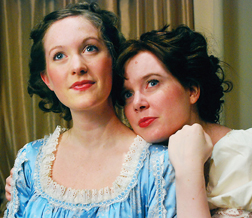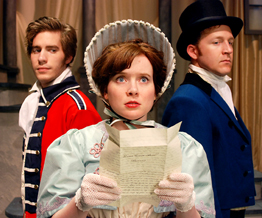From the Chicago Tribune
Classic stays fresh at Lifeline Theatre
May 3, 2012
By Kerry Reid
THREE-AND-A HALF STARS
OK, “Call me Ishmael” is punchier. But the first sentence of Jane Austen’s “Pride and Prejudice” (“It is a truth universally acknowledged, that a single man in possession of a good fortune must be in want of a wife”) is right up there in the Famous First Lines Sweepstakes. The challenge is making it sound fresh while acknowledging its classic status.
Christina Calvit’s popular Austen adaptation for Lifeline Theatre, now making its first appearance in 20 years on the stage that birthed it, cleverly deals with the challenge by having Elizabeth Bennet deliver the line to the audience. Or try to, anyway — but various town gossips keep getting in the way. With a sigh, Laura McClain’s highspirited (and, let’s face it, somewhat self-involved) Lizzy proclaims, “It’s particularly vexing when one has a good turn of phrase to be interrupted.”
Well, the course of true love and great literature never did run smooth, so why should one of the most beloved stories of courtship and marriage in English literature have an easy time of it? Still, Calvit’s sparkling take on Austen’s most famous (and oft-adapted) 1813 novel offers plenty of treats for the true Jane believers, and a sturdy introduction to her oeuvre for the handful of folks who don’t know the story. Elise Kauzlaric’s staging slyly captures the Regency-era world of dances and meaningful glances, where one social misstep could doom a middle-class young woman’s marital chances forever, and Melania Lancy’s drapes-and-windows set suggests the tension between private and public life at the heart of Austen’s world.
Fans of PBS’ “Downton Abbey” may chuckle knowingly as the fluttery Mrs. Bennet (a splendid Cameron Feagin) spits out the word “entail” — that sexist convention by which property must pass to male heirs only, and which makes marrying off her girls to men of means a priority.
That chorus of gossips pops up throughout the show, and so does Lizzy’s habit of appealing directly to the audience. At one point, she takes refuge behind a patron’s seat to hide from the smarmy Mr. Collins (Phil Timberlake, who manages to be stiff and oily at the same time), whose marriage proposal she rebuffs.
But “Pride and Prejudice” is the Lizzy-and-Darcy show. And for the most part, the chemistry between McClain’s Lizzy and Dennis Grimes’ Darcy mixes into a convincing concoction. After their first infelicitous meeting, Lizzy turns again to her confidants in the audience and asks, “What do you think of him?” and then, as is her wont, answers her own question with a pointed, “Exactly.”
It’s easier to see the shift from disdain to respect to outright passion in McClain’s performance. One wishes that Grimes would show his changing emotional colors a bit sooner. But then, subtlety and walking the fine social line are the keys to understanding Austen’s ironic wit, and snobbish Mr. Darcy is no fiery Heathcliff. Highlights among the supporting cast include Don Bender’s acerbic Mr. Bennet and Jan Sodaro’s fearsome Lady Catherine, who would give Maggie Smith’s dowager countess of Downton a run for her (inherited) money.Throughout, the riptides of deep emotion just under the surface of Austen’s pointed wordplay keep the familiar tale from growing stagnant.
From Windy City Times
May 9, 2012
By Mary Shen Barnidge
Decades before Bluestockings and Steampunk Lolitas made Jane Austen and her literary sisters into the icons they are today, Christina Calvit was forging her reputation on meticulously-crafted page-to-stage adaptations of classics from the age of romanticism (along with its latter-day descendants — Georgette Heyer, et al.), spawning a series of lucrative productions for Lifeline Theatre, many of which have since enjoyed international exposure.
The reasons for this acclaim are immediately apparent in this revival — its second since premiering in the company’s third season — of Austen’s most popular novel. The first words uttered onstage locate us firmly in the society preoccupied with money and matrimony that was fashionable England in 1813. Once we are apprised that the financial solvency of whole families could depend on their offspring marrying well, we comprehend fully why Mrs. Bennet calculates her five daughters’ courtship potential with the ruthless concentration of a general plotting strategic maneuvers. Since such schemes never succeed — not in literature, anyway — the four damsels destined for the altar discover their matches, after much deliberation, in suitors of similar values and temperament, rather than mercenary considerations (though the strictures of this literary genre dictate that nobody finish destitute).
What most distinguishes this Lifeline production is not the dazzling repartee swapped by a cast of shining new faces, augmented by seasoned troupers boasting gravitas to spare, nor is it Melania Lancy’s boat-in-the-bottle scenic design or Bill Morey’s scrumptious costumes, but the attention bestowed by director Elise Kauzlaric on environmental ambience, down to the smallest details of acceptable decorum. At the social gatherings where most of the plot development occurs, auxiliary personnel are not left to ruminate in corners like grazing cattle, but instead are assigned activities — writing letters, playing cards, or dancing exuberantly to Christopher Kriz and Natalie Turner-Jones’ museum-accurate period quadrilles, cotillions and reels.
Increasing the kinetic element places fresh emphasis on the impetuosity associated with an ethos elevating intuition over reason. Even our level-headed heroine — played with wholesome candor by Laura McClain — frequently confides coy asides to her audience (at one point, beseeching a spectator’s assistance in repelling an unwanted advance). In a theater season rife with squalid sprawl, the results make for two hours of giddy merriment that never exceeds the boundaries of civilized protocol.
From Chicago Theater Beat
Regency charm in Rogers Park
April 30, 2012
By Lawrence Bommer
FOUR STARS
Hardly restricted to 19th century nostalgia and a long-gone world of county balls and subtle etiquette, Jane Austen’s mating masterpiece is perfect for the boards. “Pride and Prejudice” abounds with recognizable beaux and belles, whiplash plot twists, and acerbic psychological observation. At its crystal-clear core are characters, open-hearted or close-minded, you really care about by novel’s end.
Or play’s end, thanks to another perfect-pitch adaptation by the incredibly faithful (in spirit as much as style) Christina Calvit. All that her supple dramatization requires is an equally faithful — and forceful — staging by Elise Kauzlaric, top-drawer performances from an immaculately-cast ensemble, and inspired blocking that keeps the intrigues and intricacies flowing and at every moment makes it certain what’s at stake and who.
The engaging evening is skillfully narrated by the author’s witty, sprightly but fallible surrogate Elizabeth Bennet (who from time to time charmingly appeals to the audience for advice). The much-filmed and staged plot charts the complex courtship strategies pursued by vaporous Mrs. Bennet (Cameron Feagin in full fluster) and other proto-soccer moms to mate her five daughters. The urgency of her matchmaking is fueled by the fear that the Bennets’ entailed estate will fall into the clammy hands of Reverend Collins (self-caricaturing Phil Timberlake), a dweebish cousin who fancies the girls himself.
The title confesses the crucial temperamental clash that fuels the amorous misunderstandings. Elizabeth (Laura McClain, in a state of animated elegance) is prejudiced against the daunting pride of the better-born Mr. Darcy (Dennis Grimes, perfect at portraying his character’s self-protective diffidence, mistaken for arrogance). She’s more directly drawn to the handsome soldier Mr. Wickham (properly dashing and callow James Gasber).
Meanwhile Jane (lovely Amanda Drinkall), the eldest and most loving daughter, falls in love with local gentry Mr. Bingley (affable Michael J.L. Kronlokken), but friendship can’t flower when Jane faces richer rivals. Subplots abound, including the machinations of the reverend’s patrician and purse-proud patron Lady Catherine de Bourgh (Jan Sodaro, furbished with finery like a Spanish galleon) and the dangerous crushes that overwhelm silly Kitty Bennet (Kelsey Jorissen) and eventually expose a certain pretty-faced scoundrel. Propelling the scintillating story is the plentiful gossip of the Meryton locals who merrily push the plot along and reveal all the risks among the rituals. Wonderful work comes from Don Bender as the much put-upon Mr. Bennet, Chelsea Paice as jolly Charlotte Lucas and Cassidy Shea Stirtz as bookish or neurasthenic young ladies.
But Austen’s most original and enticing creations remain Elizabeth and Darcy. Like Shakespeare’s feuding Beatrice and Benedick, they’re too clever to fall in love too fast. Reflexively independent and intuitive, Elizabeth makes the mistake of relying too long on the wrong first impression. Darcy errs by forgetting that skepticism and seriousness can be wrongly discredited as secrecy and hypocrisy. But we just know they’re right for each other: For much of the tale it kills us how badly two dynamic partners pursue their own happiness (but then the artful author often leads the audience into the same misapprehensions as the characters).
Few writers know or love their ambivalent inventions more than Austen. Happily, they’re as richly real on stage as on the page. Kauzlaric and Calvit honor Austen’s detailed and absorbing world. As always, Lifeline Theatre makes it look as authentic as a time trip deserves — from Melania Lancy’s well-appointed, twin-level Regency set to Sarah Hughey’s lighting (flirtatious as a fan) to Bill Morey’s gorgeous Empire dresses and fashionplate Beau Brummel men’s wear. Everything works but, rightly so, we call it a play.
From Chicago On The Aisle
‘Pride and Prejudice’ at Lifeline: Mirroring Austen’s vivacious novel in memorable faces
May 1, 2012
By Lawrence B. Johnson
FOUR STARS
Any director and cast of players who can turn Lifeline Theatre’s modest digs into a credible semblance of Pemberley, the grand residence of Mr. Darcy in Jane Austen’s “Pride and Prejudice,” has gone most of the distance in bringing this brilliant, consummately romantic and beloved novel to the stage.
Yet so it comes to pass, in Lifeline’s lovely production, when headstrong and highly prejudiced Elizabeth Bennet together with her aunt and uncle wander into Pemberley on a tour of local mansions. It’s the same space, without a jot of extra adornment, that we’ve just taken for Elizabeth’s ordinary home; only now the amazed visitors are oohing and aahing over splendors we cannot see but readily imagine with them.
The housekeeper shows them a fine portrait of the handsome owner, and moments later who should appear but the eminent fellow himself — though at the sight of Elizabeth his typically stern, cheerless mien instantly softens and he becomes affability itself, inviting Elizabeth’s uncle to fish, inviting them all back into the mansion for a drink. But you doubtless know all that, having read the book or seen the marvelous BBC miniseries (perhaps several times).
My point is that this scene, so authentically and effortlessly played, serves not only as the story’s turning point but also the moment of dramatic truth for Laura McClain’s reeling Elizabeth and Dennis Grimes’ amorously discombobulated Darcy. In this outwardly unremarkable space, they absolutely stand upon a splendid estate. We have been brought to believe in it by the whole force of events beforehand.
For anyone who has not encountered Austen’s sine qua non of romance novels, here’s the gist: Elizabeth Bennet and her four sisters, their usually hysterical mother and ever practical father, a family of humble gentility, reside in a home that will become the property of Mr. Bennet’s cousin in the event of his death, potentially leaving all the womenfolk displaced. Hence a certain urgency in finding husbands for the girls.
The eldest sister, Jane, falls in love with a young man newly arrived in the neighborhood called Mr. Bingley, a gregarious soul as remarkable for his ebullient spirit as for his considerable wealth. His good friend is a still richer but dour, socially awkward fellow called Mr. Darcy to whom Elizabeth Bennet immediately takes a disliking that is only reinforced by reports about the man. All that follows is essentially the unveiling of a more accurate likeness of Mr. Darcy and Elizabeth’s change of heart in that changing light.
“Pride and Prejudice” is a stew of great characters, and Lifeline’s staging — in an adaptation by Christina Calvit directed by Elise Kauzlaric — gets every one of them right. To care about any of it, we must be drawn to Elizabeth’s independent spirit and buy into her misgivings about the cheerless and mysterious Darcy. And McClain is indeed an endearing Lizzy, the sharp-witted favorite of Mr. Bennet, that long-suffering father of five daughters, played with delicious drollery by Don Bender. In this telling, Lizzy is also the narrator, regularly turning to the audience to explain circumstances. McClain manages this device so off-handedly, and with such infectious dollops of irony, that Lizzy and the audience steadily grow to be pals.
Grimes’ obdurate Darcy carries off the miracle of never once smiling. His finest moment is Darcy’s impulsive marriage proposal to Lizzy, an expostulation of reasons why he should view her as beneath him, barely tempered by a declaration (somewhere in there) of his undeniable affection for her. The extreme opposite of this literary icon of sobriety is Lizzy’s deeply anxious, nattering mother — embodied with scene-stealing, if not show-stealing hilarity by Cameron Feagin.
If we’re pulling for Lizzy and Mr. Darcy, we’re also cheering for the perfect match of her quietly appealing sister Jane and dear Mr. Bingley, lifted right off Jane Austen’s page here in the sweet temperament of Amanda Drinkall and Micah J.L. Kronlokken’s abashed, dreamy-eyed Bingley. Nor can I leave out three more of Austen’s priceless characters done to a T: the simpering pastor Mr. Collins (Phil Timberlake), his ever so condescending patroness Lady Catherine de Bourgh (Jan Sodaro) and the manipulative, reckless interloper Mr. Wickham (James Gasber).
Christina Calvit hews as close to Austen’s book as the constraints of stage production and reasonable time might allow, and director Elise Kauzlaric keeps the action flowing in full stream without turning this romance into a torrent of efficiency. There are indeed some wonderfully indulgent pauses, among them an extended dance in which Lizzy and Mr. Darcy are partners who seem destined never to be in philosophical step with each other. And another is the scene at Pemberley, when designer Melania Lancy’s attractive all-purpose set is touched by the magic of imagination to become a palace of hope.
On the night I attended, the show’s first 20 minutes crept at a sluggardly pace more suggestive of a work in progress than of something ready for prime time. But once it clicked into gear, the production sailed without lapse to the end. Even a great team can take the field flat.
From the Chicago Sun-Times
‘Pride and Prejudice’ returns to Lifeline for a friendly visit
April 30, 2012
By Hedy Weiss
RECOMMENDED
How will the five daughters of the financially strapped, status-challenged Bennet family ever manage to find suitable husbands?
Of course this is a question that might not be of the utmost concern in today’s more liberated societies, where women can work, and inherit property, and engage in premarital sex without life-scarring scandal. But in class-conscious England of the early 1800s, marriage meant survival for most women. And this is what sets the anxiety level at fever pitch in Jane Austen’s often comic but deceptively serious novel Pride and Prejudice.
Christina Calvit’s popular stage adaptation of the novel, which debuted at Lifeline Theatre two decades ago, is now back on the company’s Rogers Park stage under the fleet direction of Elise Kauzlaric. And while the attack of Austen-itis that hit popular culture some years back seems to have run its course, it is always a pleasure to be reminded of how certain aspects of affairs of the heart, mind, temperament (and pocketbook) persist.
It is Mrs. Bennet, the mother of the five sisters (played by Cameron Feagin, full of energy but too vocally shrill), who cannot camouflage her desperation, while her bookish husband, Mr. Bennet (a nicely understated Don Bender), is somewhat blind to the reality of life for the girls in his household.
At the center of the story is their second-oldest daughter, Elizabeth Bennet (the fresh, expressive Laura McLain), whose intelligence, pride and sense of self-worth almost get the better of her. And of course she meets her match in the aristocratic, self-possessed, no-nonsense and very wealthy Mr. Darcy (Dennis Grimes, who is no “pretty boy,” but who makes his mark through his easy sophistication and suffer-no-fools hauteur).
The rest of the Bennet girls’ suitors are an eclectic bunch. There is Mr. Bingley (Micah J.L. Kronlokken), the young, handsome and rather shy aristocrat immediately drawn to the pretty oldest sister, Jane (Amanda Drinkall), a model of good-naturedness and modesty. There is the vaguely freakish and unctuous preacher, Mr. Collins (Phil Timberlake, who easily steals every scene), who initially is foisted on Elizabeth, but ends up with Charlotte Lucas (deft work by Chelsea Paice), a woman with no romantic delusions. And there is the handsome but rather devious Mr. Wickham (the easily dashing James Gasber), a military officer who charms Elizabeth, but ends up causing a near-fatal scandal when he runs off with the hot pants of the family, 16-year-old Lydia Bennet (the giddily pretty Kirsty Rivett). The bookish, musically-ungifted Kitty Bennet (Kelsey Jorrisen), and her resentful sister, Mary (Cassidy Shea Stirtz), are more or less remaindered. Jan Sodero turns in expertly differentiated character turns as two older women of radically different personalities.
Melania Lancy’s elegantly draped set and Bill Morey’s Regency-style costumes enhance the period flavor in this classic marriage-go-round.
From Time Out Chicago
Lifeline stages Jane Austen’s trenchant Regency romance.
May 1, 2012
By Oliver Sava
THREE STARS
One year after the Brothers Grimm popularized the stories of Cinderella and Snow White, Jane Austen wrote a fairy tale for the Regency era with the romance of Elizabeth Bennet (Laura McClain) and the princely, though not very charming, Mr. Darcy (Dennis Grimes). The success of any adaptation of Austen’s seminal 1813 novel depends on the chemistry between the two proud, prejudiced lovers; director Elise Kauzlaric cultivates a strong tension between them that gradually eases as the play progresses.
Christina Calvit’s 1986 adaptation emphasizes the Bennet family’s modest means by incorporating conversations among townspeople about the family’s escalating expenses. The elegant silk drapes of Melania Lancy’s set design and Bill Morey’s bright costumes give the production a polished appearance, but there could be a stronger contrast between the Bennets’ humble lifestyle and the extravagance of Mr. Darcy and the Bingleys.
While the shrill, bawdy Mrs. Bennet (Cameron Feagin) should stand out among the sophisticates she’s trying to marry her daughters off to, Feagin’s portrayal is exaggerated to the point of caricature. McClain’s willful, witty Elizabeth is a fine match for Grimes’s rigid Mr. Darcy, who becomes immediately more amiable and alluring once he confesses his secret love for her. There’s an exhilarating release when the two finally kiss — which speaks to Austen’s lasting ability to thrill.
From the Chicago Reader
April 30, 2012
By Keith Griffith
I didn’t realize how much PBS’s wildly popular Downton Abbey owes to Jane Austen’s 1813 novel until I saw this adaptation from Lifeline Theatre. There’s the doltish bachelor cousin who stands to inherit an estate, the gaggle of marriageable daughters, and the heroine whose path to a profitable union is blocked by just one thing — her stubborn notion that one should marry for love (or, at least, attraction). Elise Kauzlaric directs a sumptuous, well-honed production, and Christina Calvit’s script closely follows the source while tightening Austen’s already narrow focus on protagonist Elizabeth (expertly played by Laura McClain). The one complaint Downton fans might bring to Austen is that her narrative excludes the lower classes, a failing that’s amplified here by cartoonish portrayals of some of the slightly less refined characters.
From chicagocritic.com
Jane Austen would be proud
April 30, 2012
By Beverly Friend
HIGHLY RECOMMENDED
Even before he is ultimately smitten, Darcy, the proud, arrogant, Byronic hero of Pride and Prejudice comments on Elizabeth Bennet’s fine eyes. There can be no finer eyes, or eyes used more effectively than those of Laura McClain in the role of Elizabeth at Lifeline Theatre. What speaking eyes she has: rolling them to express amusement, casting them down in dismay, or glaring out of them in fury. She is a most talented and expressive Elizabeth, a perfect foil for the haughty, arrogant Darcy, nailed in that role by Dennis Grimes. The duo exhibit great casting for this star-crossed pair as they hurtle towards the inevitable outcome. Grimes maintains his stiff stance and haughty sneer throughout, only relaxing when breaking into a most welcome smile at the romantic resolution.
Lifeline presents Austen’s work at its finest, offering a smashing closing production to its 29th season.
Those in the audience could (and sometimes did) recite familiar lines (softly to themselves). Many will doubtless also attend the Jane Austen Society Spring Gala at the Knickerbocker Hotel next Saturday.
But one doesn’t have to be an Austen enthusiast to enjoy the play, or to admire how skillfully it is staged. It is a constant source of amazement to note how much Lifeline does with so little — here, in limited space; there are residences, ballrooms, the lawns of an estate. Kudos to scenic designer Melania Lancy.
And of course, the story is delicious — as always — with the shrill, silly mother (Cameron Feagin) determined to marry off her five daughters; the father who fails to lead his family wisely (Don Bender); lovely but overly conservative oldest daughter Jane (Amanda Drinkall); her next sister, the bright, articulate Elizabeth; the younger girls (Kristy Rivett as Lydia, Kelsey Jorissen as Kitty and Cassidy Shea Stirtz as Mary) ) and, of course, the inimitable, unctuous clergy man who stands to inherit it all, Mr. Collins (Phil Timberlake). Add to this mix the highly (financially) desirable Mr. Bingley (Micah J.LK. Kronlokken), swashbuckling Mr. Wickham (James Gasper), practical spinster Charlotte Lucas (Chelsea Paice) and the overbearing Lady Catherine de Bourgh (Jan Sodaro) and you are in the midst of a charming cast of characters, played to the hilt in this comedy of manners. They bring to life Austen’s contribution to literature: her response to the overly romantic tradition, her focus on works that replace false sentiment and strained romance to shine the light of realism on a domestic world — and all with great linguistic skill.
In this adaption, Christina Calvit, captures every nuance. She goes beyond dialogue, to incorporate lines where author speaks to reader — as Elizabeth does just that in the play — beginning with what is perhaps the most famous opening sentence of any English novel: It is a truth universally acknowledged, that a single man in possession of a good fortune, must be in want of a wife. As Elizabeth speaks, she is interrupted several times, giving these famous words even more weight and humor as they set the stage for all the follows.
Lifeline’s production captures all the high moments of the novel, missing not a beat: the ball where Catherine and Darcy meet, Elizabeth’s the two great and contrasting proposals — from Collins and Darcy, all the wonderful confrontations.
My bumper sticker reads, “I’d rather be reading Jane Austen,” but this should be expanded to add, “Or seeing a Lifeline adaptation!”
From Chicago Stage Style
May 2, 2012
By Lori Davis
These days Jane Austen is so popular that the Austen-inspired novel is a genre all its own (think: “Bridget Jones”), and there are thousands of members in Jane Austen societies in a dozen-plus countries. For many, the stone that set off the avalanche was Andrew Davies’s 1995 BBC mini-series of “Pride and Prejudice” with Colin Firth. But my personal rockslide over “Pride and Prejudice” began with a production back in 1986 at a little theater in Rogers Park I had never heard of before: Lifeline Theatre. Ever since, when asked, “What’s your favorite play ever?” I’ve shrugged away at least three hundred other shows to say, “Lifeline Theatre’s ‘Pride and Prejudice’.”
I’m glad to say that in many ways, their new, freshly updated production is even better! Without doubt, Christina Calvit is the literary adaptor I most admire. And what she does with this often all-but-memorized novel is magic. What normally takes a five-hour mini-series to do justice, Ms. Calvit nails in under two and a half hours. Yet, somehow, nothing you want to see is missing. I kept noticing Austen lovers around me nodding hello to their favorite lines. Sure, some of us missed Colin Firth’s wet shirt, and that was Andrew Davies’s fabrication, not Jane Austen’s.
Of course, even the finest script can’t make a production great all on its own. Let me assure you that Lifeline has amassed an exceptional cast for this production, reaching beyond their own fine ensemble to fill the many youthful parts. Outstanding is not too strong a word for this cast. I want Laura McClain’s picture on my mantel as my favorite Elizabeth Bennet. Pretty, playful, and engaging, as Lizzy needs to be, Ms. McClain embodies Austen’s most loved heroine. Her skillful setdown of Mr. Darcy still echoes in my ears.
Those who know the book will be saying, “But what about Mr. Darcy?” I had my doubts when Dennis Grimes (Mr. Darcy) first appeared. But I soon came to suspect my disappointment was what I was intended to feel. Darcy isn’t supposed to be likeable at that point in the play! Sure enough, as Darcy the character unbends, Mr. Grimes’s distant, wooden poses are dropped and he shows, by a lilt of his voice, a half smile, a nod, an attentive gesture, the quiet admiration Darcy is developing for Elizabeth. It’s generally agreed that Darcy is the hardest Austen character for any actor to portray because still waters must run deep and he has so few lines with which to convey what he feels. Mr. Grimes succeeds, even without the additional plot devices Andrew Davies thought up to make us love his Darcy.
The show is filled with pitch-perfect performances. Amanda Drinkal is an appealing Jane, the sweet-natured, beautiful sister. James Gasber is such a charming, open Mr. Wickham even I’m ready to trust him (which would be to ignore thirty years’ acquaintance with the two-faced rogue). Kirsty Rivett, as Elizabeth’s hoyden sister, Lydia, warms me to this selfish child, despite her faults. The same thing happened when I met Phil Timberlake’s Mr. Collins. Mr. Timberlake is one of my favorite Lineline ensemble members; I worried I’d have to overcome my natural liking for him to let me see the odious Mr. Collins. Instead I met a self-important clergyman both tiresome and a little bit likeable at the same time.
My only disappointment was Mrs. Bennet, played by Cameron Feagan in the style popularized by Alison Steadman in the ’95 BBC miniseries: from first to last whining and shrill. Though it is a valid interpretation with comic moments, I’d like her to contemplate why Mr. Bennet first loved his bride and bring some of that charming young woman into her performance, as Maria Benner did in Christina Calvit’s earlier version performed by GreenMan Theatre Troupe in 2009.
Unlike many productions with affordable ticket prices, Lifeline’s “Pride and Prejudice” has not scrimped on the delightful Regency costumes and elegant set. Lifeline’s sets are often show stealers, and Lifeline has won multiple Jeff Awards for both costume and scenic design. I was left with only one wish: That Lifeline would decide to extend the run on into the summer. More shows, more seats. And this production is not to be missed! On a scale of one to four stars, I give it a five. And if you love Austen’s novels, double them again.
From Stage and Cinema
A PRODUCTION TO TAKE PRIDE IN
May 1, 2012
By Dan Zeff
All of Jane Austen’s novels are built on the same premise. A woman meets and marries an eligible man after a series of usually comic difficulties. But Austen extracts a remarkable amount of drama, comedy, and human interest from her domestic tales through her witty, ironic prose and her shrewd but forgiving eye for human weakness.
Pride and Prejudice is Austen’s best-known novel, and its rich tapestry of characters and urbane dialogue have made it a natural for the stage, television, and motion pictures. The Lifeline Theatre has created a niche for itself dramatizing literary classics, and the company has come up with a gem, combining Christina Calvit’s stylish adaptation with scintillating performances by a large cast to capture the culture of genteel English provincial life in the early nineteenth century.
Pride and Prejudice takes us into the home of the Bennet family, Mr. and Mrs. Bennet and their five unmarried daughters living in Meryton in the county of Hertfordshire. The local society resembles a giant marriage market, with the eligibility of single men pegged to their annual income (5,000 pounds a year is desirable and 10,000 pounds a year makes the bachelor the lodestar of every ambitious mother and simpering daughter in the county).
Elizabeth Bennet is the high spirited and independent daughter in the Bennet clan. Opposite her is Mr. Darcy, one of the 10,000 pounds a year bachelors, a haughty young man who does not suffer fools gladly and sees fools all around him in Hertfordshire, especially female fools. Elizabeth and Darcy are clearly destined to be united, but in Austenian fashion they at first antagonize each other, their conflicts intensified by a series of misunderstandings. By the end of the story, Darcy relinquishes his stiff-necked pride and Elizabeth yields her prejudice against him and they unite in which should be an exceptionally lively and affectionate marriage.
The Elizabeth-Darcy bumpy romance holds the center stage, but there are numerous subplots, two involving Elizabeth’s sisters Jane and Lydia plus an antagonism between Darcy and an army officer named Wickham. The novel is awash in colorful characters, the most important deliciously preserved in the Calvit adaptation. Other than the Bennet family and Darcy, the most prominent figures include the fatuous clergyman Mr. Collins, the imperious dowager Lady Catherine de Bourgh, Darcy’s friend Mr. Bingley, and Bingley’s sister Caroline. Then there are busybody gossiping neighbors, assorted servants, and visitors who mingle with the locals, all contributing to the social rivalries and class differences that animated the society of that day.
The Lifeline has assembled a bull’s-eye cast of 14, many playing multiple roles to create the population of an entire town and its environs, all dressed in the formal styles of the early nineteenth century. Laura McClain is the first among equals as Elizabeth, a young woman too intelligent and willful to fall into the vale of giggling, husband-seeking females around her, though Elizabeth would happily accept a mate, if he were a match for her spirited personality.
Cameron Feagin deserves special commendation for bringing off the character of Elizabeth’s mother Mrs. Bennet so credibly. The role is filled with acting traps to milk the lady for easy laughs as the fluttering woman goes about matchmaking for her girls. Fagin’s Mrs. Bennet does her share of dithering and comic self-dramatizing, but she remains a person and not a platform for acting tics.
Dennis Grimes is very good as the standoffish Darcy, though his shift from haughtiness to humble supplicator for Elizaqbeth’s hand may be a little abrupt. Don Bender is outstanding as the droll and long suffering Mr. Bennet, a father who is sentenced to be the only male in an otherwise all female household, with the small tensions and emotional highs and lows that carries. Phil Timberlake is perfect as the fatuous Mr. Collins, and Kelsey Jorissen is an eye catching Caroline Bingley, who looks with disdain at the provincial bumpkins she must endure accompanying her brother to Hertfordshire.
In an ensemble this good, everyone deserves recognition: William Bullion, Amanda Drinkall (excellent as the love struck Jane Bennet), James Gasber (Mr. Wickham), Micah Kronlokken (Mr. Bingley), Chelsea Paice, Kirsty Rivett (excellent as the flirty and headstrong Lydia Bennet), Jan Sodaro (first rate as the Olympian Lady Catherine de Bourgh), and Cassidy Shea Stirtz.
The success of the production owes much to the deft directing of Elise Kauzlaric, who orchestrates the action with pace and supplies countless wry touches to flesh out the characters and incidents in the play. Melania Lancy has designed a bi-level set that allows the characters to move fluidly from scene to scene with vertical as well as horizontal freedom.
Special props go to Bill Morey for his huge wardrobe of authentic looking period costumes and Natalie Turner-Jones, who is credited as movement director. I presume she is responsible for choreographing the social dances that add much charm and humor to the staging. Sarah Hughey designed the lighting and Christopher Kriz the sound (and mood-setting original period music).
The real hero of the evening is Jane Austen, with her mastery of sophisticated language, her sure eye for human weakness, and her delightful portrayals of provincial everyday life. The triumph of the Lifeline production is its fidelity to Austen’s original masterpiece.



























